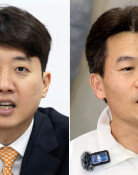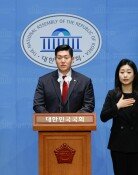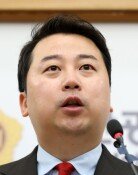Chaebol and politics: Market first
Chaebol and politics: Market first
Posted November. 03, 2000 20:18,
Companies have lives. A number of companies are born and die each day. Just this September, 2,630 companies were newly established, according to statistics compiled by the Bank of Korea, and 210 companies closed their doors. Excluding no-work days, the tally shows that about 100 firms were born and eight to nine disappeared a day on average. Dong Ah Construction, a leading builder who once ranked 10th in the industry, went under court receivership and Daewoo affiliates were also forced out of the market en masse. The fate of Hyundai Engineering and Construction (HEC) also rests with the hands of creditors. It indicates that an epochal event is taking place in the nation¡¯s industrial history.
By seeing a number of companies exited, business circles have come to think about things such as chaebol and politics, business secession and emperor-style management.
When the current administration was sworn in, Kim Woo-Choong, former chairman of the now-defunct Daewoo Group, met with President Kim Dae-Jung frequently and orchestrated the reform project of the new government. Hyundai Group (Honorary Chairman Chung Ju-Yung) also pushed ahead with North Korean projects and finally opened the way for inter-Korean economic cooperation and the historic South-North summit meeting. Daewoo and Hyundai seemed to sail smoothly at the time as they stood in the vanguard of the government¡¯s economic reforms and North Korean projects. However, today with more than half of Kim¡¯s term expired, HEC and Daewoo are ailing.
On the other hand, Samsung and LG, which suffered great difficulties in those days, are now facing different situations. At the inauguration of the current government, Samsung (Chairman Lee Kun-Hee) was forced to give up its auto-making business, which Lee had devoted himself to so much. Samsung, which was selected as the first target for reforms, had to hold its breath, as a high-ranking official once put it. But the group is currently enjoying the best time since its foundation. It earns more than 8 trillion won a year in net profits and all its affiliates are in the black.
LG also shed tears when it was forced to hand over its semiconductor business to Hyundai in the process of the business swaps sweeping chaebol, but it is now preparing for a new leap forward based on the information technology, energy and electronics businesses.
On these changes, a business figure commented that the Korean economy is undergoing a large-scale reshuffle to establish an economic system in which management ability is valued more than connections with political circles.
Business circles now see that owners¡¯ autocratic management and second-generation businessmen¡¯s lax management can no longer prevail over market forces. A high-ranking official of a business group identified only by its initial A warned that if a business owner insists on the analog-style management of the 1960s and 1970s in the present digital era, the market and investors will turn their back on him. He predicted that the attitude of placing priority on the market would be more prevalent in the future.
Numerous rises and falls have taken place in the nation¡¯s industrial history, which spans less than 50 years. Of the top 100 conglomerates, based on turnovers in 1965, less than 20 have survived. Among the top 10 chaebol listed in 1960, only Samsung and LG still keep their posts. Conglomerates such as Donglip Industrial, Samho, Gaepung and Kukdong are now almost erased from the people¡¯s memory. The chaebol monopolized finance and sales routes under governmental protection, but they are now gone because they went against the currents of change.
Nam Duck-Woo, former prime minister, said that an able manager should quickly respond to changes. Managers who fail to predict the fast changes of an era and find ways to adapt to them will finally be unable to survive.
Paik Young-Hoon, director of the Korea Industrial Development Institute, also said that he finds it hard to find a puritanical industrialist spirit in the businessmen of today and feels the chaebol lack philosophies. He said that nothing can be done about corporate ebb and flow, but managers need to pay attention to relative poverty amid acute social changes and understand the changes of an era.







